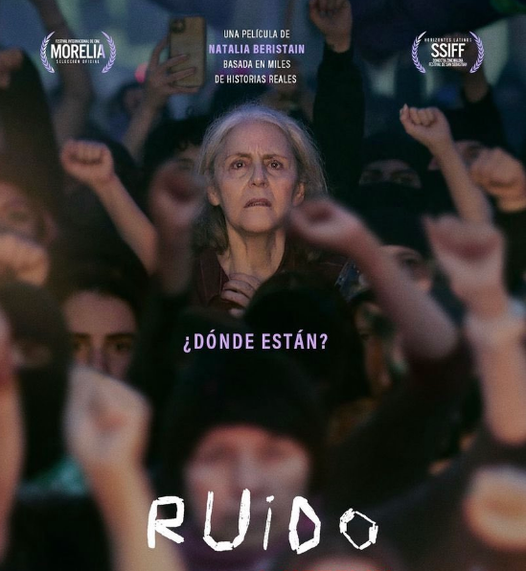Raul Romero

The daylight is fading and the darkness announces that the show is about to begin. The night is cold and the testimonies shared at the microphone make it even colder. One by one, mothers with daughters who have been victims of femicide or who have disappeared are passing by to speak. They share their painful experiences, talk about impunity and re-victimization. Hearts are being squeezed. Most of the women in attendance listen attentively. Some cry, many embrace. The event itself is a collective embrace. From time to time, several people sound pots, drums and whistles to make noise, to make themselves heard.
It is Friday, January 27, and the collectives that support the Glorieta de las Mujeres que Luchan (Roundabout of Women in Struggle) have organized to screen Natalia Beristáin’s most recent film, Ruido (Noise). The film also compiles a set of painful testimonies, similar to those shared at the microphone. But it is also hopeful, just like the event at which the film is screened. The director has brought to the cinema an unfortunate story in which many see themselves reflected. This is not a documentary, but a film in which it is impossible to distinguish fiction from reality. With the masterful performance of Julieta Egurrola, the film makes visible from a particular story many of the problems of our society: femicides, disappearance of people, murder of journalists, organized crime, trafficking of women, corruption. It also brings to the screen some of the resistance that emerges in this territory, that of the searching mothers and the women who struggle, two of the most representative social movements of our time.
Among those in attendance is Doña María Herrera, a mother of four missing children. Doña Mary, as she is affectionately called, has knocked on every door in the search for her children. She has traveled the entire country. She demanded from Felipe Calderón, Enrique Peña Nieto and also from the current president efficient policies to search for her children and all the missing people, as well as ways to pacify the country and put an end to violence. Doña Mary has traveled to the United States to demand an end to the war on drugs. She has also met with Pope Francis to tell him about the situation of the victims in Mexico. Some time ago, Doña Mary learned to walk in collective and now accompanies other mothers who are in a similar situation to hers. After watching Ruido, Doña Mary thanks the director for the film and sends greetings to Julieta Egurrola. Doña Mary knows Julieta, the actress who has accompanied the victims’ movements at different times.
On March 8, 2019, in front of the Palace of Fine Arts, the Anti-Monument, a kind of protest against a femicidal country, was installed by different collectives. On September 25, 2021, many of these same women took over the old Christopher Columbus traffic circle, which they renamed the Glorieta de las Mujeres que Luchan (Roundabout of Women in Struggle), and where there used to be a statue of the conquistador, they placed a statue of a woman.
Along with the Roundabout, in other parts of Mexico City, there are at least 13 other anti-monuments: to Samir Flores, to the victims of October 2, 1968, to the miners trapped in Pasta de Conchos, to the 49 children of the ABC Day Care Center, to the 43 students of Ayotzinapa, to the 72 migrants in San Fernando…. These are public spaces recovered to remember that there are crimes that remain without justice and truth. Crimes, such as femicides and the disappearance of people, that continue to occur on a daily basis.
Since its inception, the Glorieta de las Mujeres que Luchan has become a memorial from below, supported by women’s and victims’ collectives, as well as by people from the artistic community. Women from many different struggles have come to enrich the memorial and participate in its maintenance. Magdalena García, Mazahua and victim of the repression in San Salvador Atenco in 2006, is one of them. Mothers of the 43 disappeared students from Ayotzinapa have also been there, as well as Mazatec women from Eloxochitlán de Flores Magón who are fighting for the freedom of their political prisoners. So it is no coincidence that the screening of Ruido was also attended by dozens of activists, artists, searching mothers and journalists in solidarity. In Ruido, Natalia Beristáin managed to communicate part of the pain of this country. She did it from the power of art with the strength of resistance. Victims’ and women’s organizations have begun to make the film their own. Part of what is new and also of what is urgent converges in this dialogue. Let’s continue making noise.
This article was published in La Jornada on February 12, 2023. https://www.jornada.com.mx/2023/02/12/opinion/011a2pol
English translation by Schools for Chiapas.
